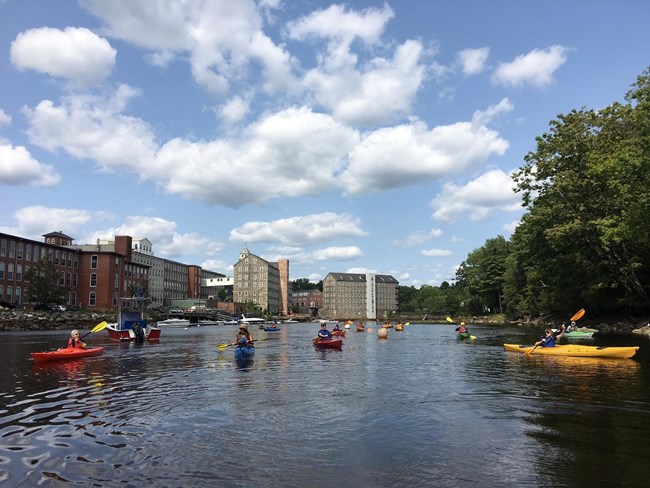Last updated: November 30, 2020
Article
Recreation | Lamprey River recreation bolstered by boating access and increased recreational passage
by Suzanne Petersen, Lamprey River Advisory Committee, outreach specialist
The Lamprey River lacks major recreational facilities such as beaches or big parks, but several partnerships have bolstered public awareness and enjoyment.
In the past four years, the Lamprey River Advisory Committee (LRAC) has awarded Community Grants to add kiosks and improve nature trails at two small town parks. Kayak racks were donated to hold town-owned kayaks for recreational programs in Newmarket. The kayaks are also available to the public to rent at a reasonable rate on site, thus eliminating the need to transport boats on private vehicles. These partnerships with town recreational departments have also facilitated LRAC-sponsored events, such as guided ecology and history paddling trips, and built connections with a local chamber of commerce.

The annual tidal Eco-paddle has been a model of cooperation with multiple partners. Experts from UNH, The Nature Conservancy, and the Great Bay National Estuarine Research Reserve offer important context, and answer questions along the way about dams and river herring, oyster restoration, eelgrass research, and water quality trends. Kayaks and safety support are offered by town and private co-sponsors.

In 2018, the LRAC partnered with Trout Unlimited to assess a section of the river that is particularly challenging for paddlers due to several downed trees. After assessing the safest path for paddlers, Trout Unlimited staff provided guidance and skills to cut passageways and carefully relocate wood so that fish habitat would be maintained, and shore banks would be protected from erosion. Through this pilot project, a site assessment protocol was developed, best practices were learned, and recreational passage was greatly improved.
